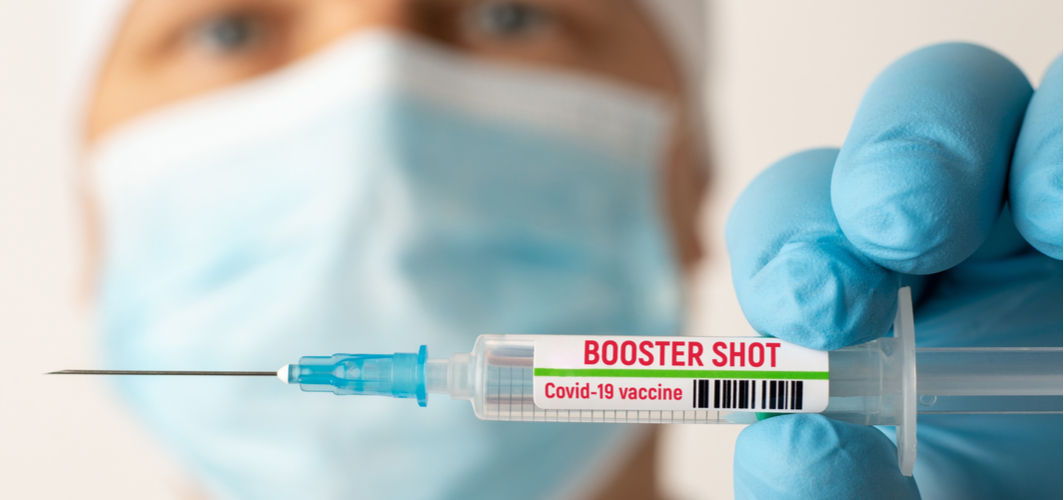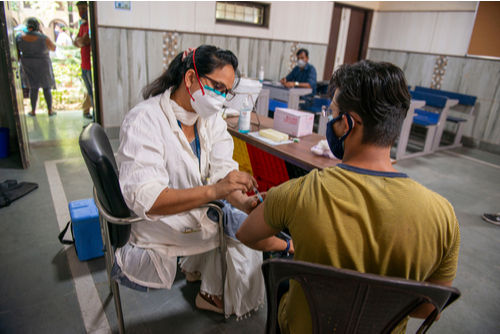COVID-19 Vaccines
Can a Booster Dose Protect Against Omicron?
3 min read
By Apollo 24/7, Published on - 04 January 2022, Updated on - 12 January 2023
Share this article
5
51 likes

Recently, Prime Minister Narendra Modi announced that India would begin administering ‘precautionary’ booster doses of COVID-19 vaccines to at-risk groups from January 10, 2021. This surprise announcement has come as a big relief at a time when the entire country is witnessing an Omicron-fuelled surge of COVID-19 cases.
Experts say that the immunity offered by the two initial doses of the vaccine declines over time, necessitating the need for a booster dose. Nevertheless, apprehensions abound regarding getting an additional dose of the vaccine. This article explores the role of booster doses in controlling the spread of the Omicron variant.
Recommended reading: Frequently Asked Questions on COVID-19 Vaccines
Is a Booster Dose Necessary?
COVID-19 vaccines help our immune systems fight the virus by facilitating the production of neutralizing antibodies and developing memory cells. However, the protection offered by the initial doses of the vaccines wanes over time, making us susceptible to infection and severe disease. To reduce the risk of infection after vaccination, a booster dose is recommended.
A booster dose is an additional dose of the COVID-19 vaccine that is administered to offset the decline in the protection offered by the initial doses. The booster shot works by inducing the immune system into thinking that it is once again exposed to the virus. As a result, the antibodies and other immune cells are called to action one more time. This increases the quantity and quality of antibodies produced by the body.
According to experts, booster doses make the immune system better at producing new and different types of antibodies. These new antibodies are believed to be more effective at recognizing and fighting against variants with multiple mutations such as Omicron.
Real-World Studies Find Booster Doses to be Beneficial Against Omicron
According to a study conducted by a team of researchers at the University of Oxford, a booster dose of the AstraZeneca (Covishield) vaccine is effective against the Omicron coronavirus variant of the SARS-CoV-2 variant. The study found that the third dose of the vaccine was able to increase antibodies against the Omicron variant to levels that are similar to those observed against the Delta variant after the second dose.
Similarly, studies conducted on other COVID-19 vaccines made by Pfizer-BioNTech, Moderna, and Johnson & Johnson also suggest that booster doses do offer protection against the Omicron variant. Nevertheless, scientists say that more real-world data is needed to determine the effectiveness of booster doses against Omicron in the long run.
Who is Eligible for Booster Dose in India?
The Indian government has decided to refer to the booster dose as a ‘precautionary dose’. Overall, there is not much difference between the two terms. A booster dose is administered when a person has received both the doses of the vaccine, and protection against the virus has decreased over time. On the other hand, a precautionary dose is given to people who may be at a higher risk of contracting infection due to their profession, comorbidities or compromised immune systems, to improve their response to the initial vaccination.
In India, adults over the age of 18 years are eligible for a precautionary dose, nine months after their second dose. These people can register for the precautionary dose through the CoWin web portal.

Recommended reading: Can RT-PCR Tests Detect the Omicron Strain?
Takeaway
The introduction of the booster or precautionary dose is a welcome move. While only certain groups are currently eligible for the additional dose, it is likely that the coverage for the booster dose will be extended in the days to come. People who have received their second dose should consider getting the booster dose once it is available to them. Till then, the best way to reduce your risk of infection from Omicron is to follow the established COVID-appropriate guidelines.
Are you worried about the risk posed by the Omicron variant? Don’t worry!
COVID-19 Vaccines
Leave Comment
Recommended for you

COVID-19 Vaccines
Top things you should know about Corbevax: The COVID-19 Vaccine for kids
Corbevax is a safe and effective COVID-19 vaccine that can be administered to kids in the age group of 12 to 14 years to protect them against the contagious coronavirus.

COVID-19 Vaccines
The Benefits of Getting a COVID-19 Vaccine
While the vast majority of our country is waiting eagerly in anticipation of getting a vaccine, there are a few who are either unwilling or unsure about getting vaccinated.

COVID-19 Vaccines
Debunking COVID-19 Vaccine Myths with Facts
The apprehensions and fears about COVID-19 vaccines have been fueled to a great extent by the myths and misconceptions circulating on social media.
Subscribe
Sign up for our free Health Library Daily Newsletter
Get doctor-approved health tips, news, and more.
Visual Stories

COVID-19 Vaccine Factbox: Pfizer/BioNTech/Fosun
Tap to continue exploring
Recommended for you

COVID-19 Vaccines
Top things you should know about Corbevax: The COVID-19 Vaccine for kids
Corbevax is a safe and effective COVID-19 vaccine that can be administered to kids in the age group of 12 to 14 years to protect them against the contagious coronavirus.

COVID-19 Vaccines
The Benefits of Getting a COVID-19 Vaccine
While the vast majority of our country is waiting eagerly in anticipation of getting a vaccine, there are a few who are either unwilling or unsure about getting vaccinated.

COVID-19 Vaccines
Debunking COVID-19 Vaccine Myths with Facts
The apprehensions and fears about COVID-19 vaccines have been fueled to a great extent by the myths and misconceptions circulating on social media.